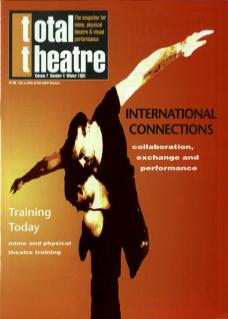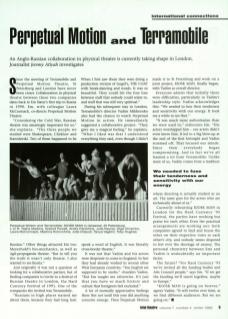Since the meeting of Terramobile and Perpetual Motion Theatre, St Petersburg and London have never been closer. Collaboration in physical theatre between these two companies dates back to Em Slater's first trip to Russia in 1990. Em, with colleague Laura McCormack, co-directs Perpetual Motion Theatre.
‘Considering the Cold War, Russian theatre was amazingly important for us,’ she explains. ‘The three people we studied were Shakespeare, Chekhov and Stanislavski. Two of them happened to be Russian.’ Other things attracted Em too: Meyerhold's bio-mechanics, as well as Agit-propoganda theatre. ‘But to tell you the truth it wasn't only theatre. I also wanted to see Russia.’
And originally it was not a question of looking for a collaborative partner, but of finding companies to invite to a festival of Russian theatre in London, the Hard Currency Festival of 1991. One of the companies she invited was Terramobile.
‘Russians in high places warned me about them, because they had long hair. When I first saw them they were doing a production version of Gogol's The Coat with break-dancing and words. It was so beautiful. They could hit the fine line between stuff that nobody could relate to, and stuff that was still very spiritual.’
During his subsequent stay in London, Terramobile's director Vadim Mikheenko also had the chance to watch Perpetual Motion in action. He immediately suggested a collaborative project. ‘They gave me a magical feeling,’ he explains. ‘What I liked was that I understood everything they said, even though I didn't speak a word of English. It was literally cross-border theatre.’
We needed to fuse their tenderness and sensitivity with our energy
It was not that Vadim and his actors were desperate to come to England: in fact they had already worked in several other West European countries. ‘You English are supposed to be snobs,’ chuckles Vadim. ‘But Em taught me otherwise. It's just that you have so much history and culture that foreigners feel excluded.’
A lot of mutually appreciative feelings then. But not until this year did anything concrete emerge. Then Perpetual Motion made it to St Petersburg and work on a joint project, Kiosk Man, finally began, with Vadim as overall director.
Everyone admits that initially there were difficulties, particularly in Vadim's leadership style. Vadim acknowledges this: ‘We needed to fuse their tenderness and sensitivity with our energy. It took me a while to see that.’
‘It was much more authoritarian than we were used to,’ elaborates Em. ‘His actors worshipped him – our actors didn't even know him. It led to a big blow-up at the end of the first fortnight and Vadim stormed off. That focused our minds. Since then everybody began compromising. And in fact we've all learned a lot from Terramobile: unlike most of us, Vadim comes from a tradition where directing is actually studied as an art. The same goes for the actors who are technically ahead of us.’
Currently rehearsing Kiosk Man in London for the Hard Currency '95 Festival, the parties have nothing but praise for each other. Even the practical arrangements are working out: both companies agreed to feed and house the other on their respective visits to each other's city, and nobody seems disposed to fret over the shortage of money. The personal chemistry between Em and Vadim is undoubtedly an important factor.
The future? ‘For Hard Currency '95 we've invited all the funding bodies and Arts Council people,’ says Em. ‘If we get the funding we'll travel together, maybe in Europe.’
‘Kiosk Man is going on forever,’ agrees Vadim. ‘It will evolve over time, as we find different audiences. But we are going on.’

